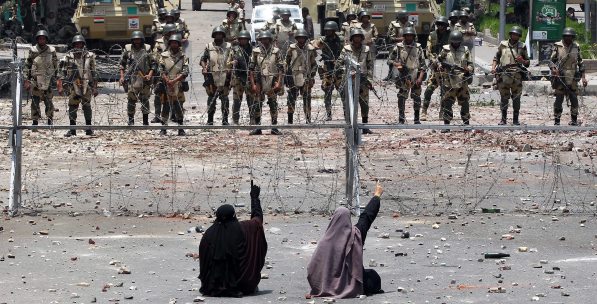The Muslim Brotherhood (Ikhwan) and the military established good relations during the Egyptian Revolution of 1952 and during one and a half year ruling of the President Muhammed Naguib. However, situation suddenly turned into to the detriment of the Ikhwan after Gamal Abdel Nasser and his friends overthrew Naguib and placed him under house arrest.
In the wake of the January 25 Tahrir Revolution, the Egyptian military-Ikhwan relations and their historical ties were brought to the agenda once again. In the following months, people began to ask whether or not the Ihkwan-military relations will go back to the relations during the 1954 incidents. The Egyptian military’s 48-hour ultimatum after millions of Egyptians took to the streets on June 30, 2013 and the military intervention on July 3, 2013 did not prove these questions wrong. This was because a difficult period has begun in the relations between Ikhwan and the military after President Mohammed Morsi was overthrown and this reminds us the relations between the two during the Abdel Nasser ruling.
THE BEGINNING OF THE IKHWAN-MILITARY RELATIONS
The Muslim Brotherhood began to influence the Egyptian army and officers in 1938. The Egyptian army was in a difficult condition in economic terms and their morale was at rock bottom during the British occupation of Egypt. The establishment of the Muslim Brotherhood which received the support of the society in a very short period of time drew the attention of young military officers more and more of whom believed that it is possible to improve the morale and motivation of the army through Islamic religious education.
At that time, al Nazir journal published by the Muslim Brotherhood brought problems in the army to the agenda and informed the public opinion; therefore, increasing sympathy of military officers for the Ikhwan. Al Nazir, for example, wrote that Azan was not recited in military units and soldiers were not allowed to perform Salat.
Officers, who were influenced by the Ihkwan, gained strength in the army and in December 1941 they submitted a proposal to the King via a representative. They demand the prevention of activities against Islam in the army and permission to officers to follow the commandments of Islam. Later on, handouts were distributed in the army. These handouts carried the signature of a group called “Free Officers.”
Religious scholars and intellectuals from outside gave seminars to soldiers on the occasions of Hijri New Year, Ramadan and religious holidays. Hassan al Banna was also among those who preached to soldiers. These organizations were usually held by officers influenced by the Ikhwan.
The Muslim Brotherhood, at first, made contact with patriotic officers in the army. Aziz Ali alMisri came first on the list. Young officers in the Egyptian army regarded al Misri as their godfather. It is argued that al-Misri is the one who introduced Hassan al Benna to the military.
FREE OFFICERS- IKHWAN RELATIONS AND ABDEL NASSER
The Egyptian Revolution of 1952 against the King Farouk, one of the grandchildren of the Mehmet Ali Pasha, Governor of Egypt during the Ottoman reign, was carried out by the Muslim Brotherhood and its affiliate in the army, the Free Officers. The Free Officers movement was founded by Mahmud Labib. He himself introduced figures such as Nasser and Anwar Sadat to the movement. Nasser came to power after Labib died from an incurable disease. Free Officers led by Nasser did not have the courage to make such an attempt without the support of Hassan al Hudaybi, the General Guide of the Muslim Brotherhood. This was because the Muslim Brotherhood was the only strong organization that would calm down people in the streets after the King Farouk was overthrown and exiled to Italy.
A military intervention put an end to one and a half year ruling of the President Muhammed Naguib who came to power after the King was ousted. Nasser and his friends carried out a military coup against the President Naguib thou







